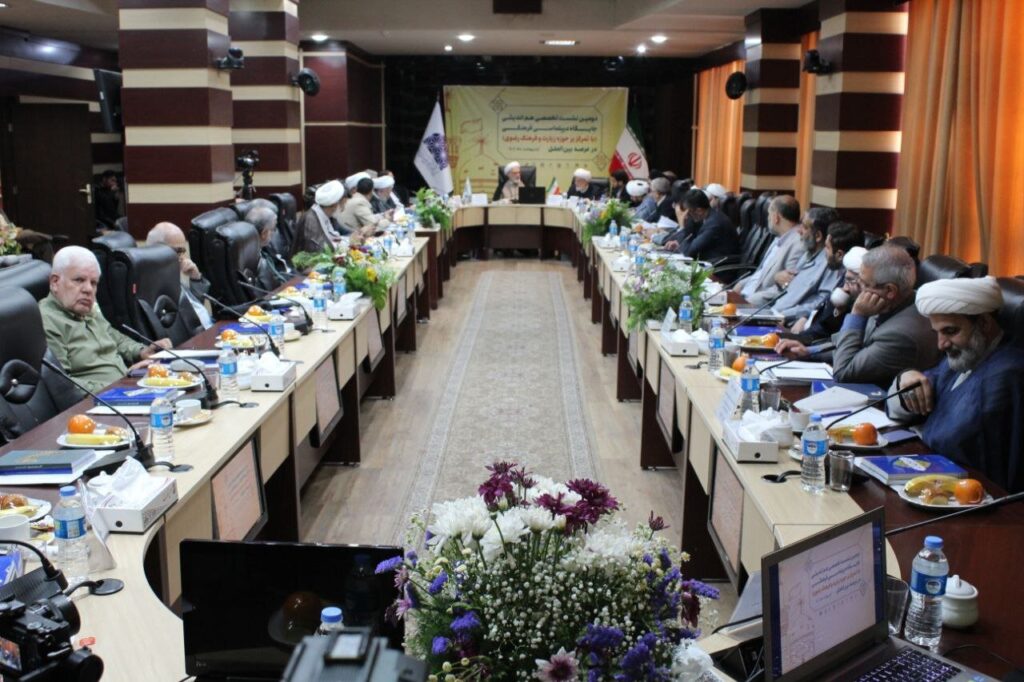Mashhad – The second specialist meeting on the importance of cultural diplomacy, particularly in the realm of pilgrimage and Ahl Al-Bayt culture, was held on the sidelines of the 21st Imam Reza (AS) International Festival in Mashhad on Friday morning.
The meeting was held successfully with the participation of key officials and experts, including representatives from the Ministry of Foreign Affairs and the Islamic Cultural Organization (ICRO) of Iran.
Built in last year’s session, the event aims to promote synergy amid the initiative to enhance the global presence of Ahl Al-Bayt and Razavi Culture.
The conference featured 13 speeches highlighting the importance of expanding Iran’s soft power through cultural diplomacy. The prominent theme was the strategic role of Razabi’s diplomatic sphere, highlighting the global mission to promote Islamic civilization and the teachings of Imam Reza (AS).
From Lebanon, renowned scholar, author and researcher Sheikh Jafar Al Mohaijar is the founder of the Baalbek-based Bahauddin Centre, and shared a comprehensive report on recent academic efforts.
“Our Centre has released 52 titles offering new, historically accurate stories of Shia Islam, countering exaggerated and distant accounts. We aim to highlight the efforts and sacrifices of Aar Al Beit.
” amidst the continued difficulties and destruction in Lebanon, we are seeking international support to maintain our activities. Hezbollah remains our main supporter and our centre is facing closure without external assistance,” he explained.
On his side, Australian native Sheikh Zaid Alsalami, a member of the AHL AL-Bayt World Assembl, addressed the challenges faced by the Muslim community in particular in Australia.
“Many young Muslims in the West are unaware of the importance of pilgrimage and the cultural heritage (AS) of Imam Reza,” he explained.
“Despite the numerous Islamic centres, Westernization and cultural invasion make it difficult to maintain our identity. I actively encourage young people to visit sacred places and promote awareness through social media and translation into English,” he said.
The quality of translation and the dissemination of accurate information is extremely important. He added, especially as reading habits have declined and social media dominates communication.
In his remarks, Hamidreza Albab Soleimani, vice-minister of leadership in culture and Islamic stated that “meetings with fellow believers promote growth and vitality even if the long interval separates these encounters.”
“This conference serves as a valuable opportunity to develop cultural diplomacy and reminds us that our cultural mission is spreading across borders. As a universal religion, Islam requires that our message benefit all humanity,” he added.
“Today, many people around the world are new to the Qur’an and Ahl al-Bayt. If Mashhad can accurately fulfill its mission and communicate this message effectively, it will serve humanity and help expand Islamic civilizations around the world.
Hassan Ali Akragi, a member of the Iranian parliament, emphasized the spiritual importance of Ahl al-Bayt.
Today, he said the Islamic Republic of Iran stands as a powerful entity on the international stage embodying the axis of resistance.
He said Mashhad, along with the existence of Imam Reza (AS), could become a hub of social and spiritual vitality and unite the Islamic world.
“We need to turn Mashhad into the country’s first free science zone and utilize universities and research centres. Such academic and scientific developments will strengthen resistance to arrogance and imperialism.”
Also at the event, Hossein Yekta, a well-known veteran of the Iran-Iraq war and public figures, emphasized the centrality of martialism and sacrifice in the ongoing struggle of good and evil. “International languages are not just English, but the language of sacrifice and martialism,” he said.
“To communicate effectively with the new generation, we need to incorporate artificial intelligence and innovative storytelling to coordinate ways that counter hostile narratives and promote causes around the world.”
On his part, Nahi Al Baraga expert Hamidreza Mahdavi Alfa discussed the nuances of cultural diplomacy in contrast to Iranian Western practice.
“In the West, cultural tools are often used for political purposes, but in Iran, culture itself is the goal,” he explained, adding:
ICRO official Hossein Divsalar emphasizes that cultural diplomacy serves as a bridge between nations and advocates a soft power approach rooted in peaceful coexistence. “The message of the Islamic Republic is one of civilization, peace and intercultural dialogues,” he pointed out.
The conference concluded with a common consensus on the need for an innovative and linguistically sensitive outreach strategy and the importance of promoting Iran’s cultural and spiritual values at the global stage to promote unity, peace and mutual understanding among nations.
The Imam Reza (AS) International Festival is held annually in various states of the country and several other countries.
The festival includes a variety of areas such as articles, theater, scripts, shows, stories, visual arts, books, literary texts, poetry, press, digital works, and radio and television production.
It aims to promote artistic excellence rooted in spiritual and cultural values.
sab/

